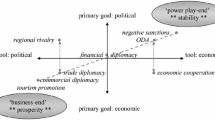Abstract
This article examines Japan’s search for a more active international role in the Korean peninsula after the Cold War. It argues that Japanese foreign policy toward the Korean peninsula after the Cold War has continued to exhibit a reactive posture due to several important constraints. The United States has remained an important factor in shaping the Japanese foreign policy agenda in the post-Cold War era. Moreover, the Japanese domestic political environment, despite the dramatic political realignment after 1993, has continued to favor a nonmilitary Japanese role in world affairs. Finally, the lingering Korean mistrust toward Japan has hampered Japan’s bid to increase its political profile. Consequently, these constraints ensure that Japan’s independent role in the Korean peninsula will be rather limited in the foreseeable future.
Similar content being viewed by others
References
For example, see Kent Calder, “Japanese Foreign Economic Policy Formation: Explaining the Reactive State,”World Politics, Vol. XL, No. 4 (July 1987).
Cited in Sharif M. Shuja, “Perspective on U.S. and Japan’s Strategy in Korea: Interests, Ambitions and Objectives,”Korea Observer, Vol. XXXII, No. 2 (Summer 1996), p. 215.
Byung-Joon Ahn, “Japanese Policy toward Korea,” in Gerald Curtis, ed.,Japan’s Foreign Policy after the Cold War: Coping with Change (Armonk, New York: M.E. Sharpe, 1993), pp. 263–266.
Tsuneo Akaha, “Japan’s Comprehensive Security Policy: A New East Asian Environment,”Asian Survey, Vol. XXXI, No. 4 (April 1991), p. 336.
Cited by Sharif M. Shuja, “Perspective,” p. 220.
See Japanese Ministry of Foreign Affairs,Diplomatic Bluebook, 1991, p. 211.
Byung-Joon Ahn, “Japanese Policy toward Korea,” p. 270.
See Sato Katsumi, “The Danger of Appeasing Pyongyang,”Japan Echo, Vol. XXI, No. 2 (Summer 1994), p. 50.
The JEI Report, August 16, 1992.
See Sato, “The Danger of Appeasing Pyongyang,” p. 50.
For the Ozawa report, see Aurelia George Mulgan, “International Peacekeeping and Japan’s Role,”Asian Survey, Vol. XXXV, No. 12 (December 1995); also seeJEI Report, August 25, 1995. For details about the content of the 1992 PKO law, see Courtney Purrington, “Tokyo’s Policy Responses during the Gulf War and the Impact of the ‘Iraqi Shock’ on Japan,”Pacific Affairs, Vol. 65, No. 2 (Summer 1992).
Yoshihide Soeya, “Japan’s Multilateral Diplomacy in the Asia-Pacific and Its Implications for the Korean Peninsula,”Asian Perspective, Vol. 19, No. 2 (Fall/Winter 1995), pp. 230–231.
Michael J. Green and Richard J. Samuels, “Recalculating Autonomy: Japan’s Choices in the New World Order,”NBAR Analysis, Vol. 5, No. 4 (Washington, D.C.: The National Bureau of Asian Research, 1994), p. 15.
See Okazaki Hisahiko and Shiina Motoo, “Hostilities in Korea: How Should Japan Respond,”Japan Echo, Vol. XXI, No. 2 (Summer 1994), pp. 52–53.
SeeAsahi Shimbun, April 19, 1994, p. 1; April 20, 1994, p. 2; and April 26, 1994, p. 1.
The Yomiuri Shimbun, “Japan’s Role in Sanctions against North Korea Unclear Problem,” June 9, 1994, p. 3.
“Hata on DPRK Contingency ‘Perfect Measures,’”FBIS-EAS, May 13, 1994.
Hidenaka Kato and Satoshi Isaka, “Tough choices for Hata over the Korea Issue,”The Nikkei Weekly, May 23, 1994, p. 4.
“Defense Chief Backfires on Collective Security,” FBIS-EAS-940-89, May 9, 1994, pp. 4–5.
FBIS-EAS-94-086, “SDPJ, JCP: Hata Trying to Spoil Constitution,” May 4, 1994, p. 4.
Cited in Glenn Hook,Militarization and Demilitarization in Contemporary Japan (New York: Routledge, 1996), p. 124.
“Murayama: UN Involvement Limited to Non-Military Contributions,”FBIS-EAS-94-156, August 12, pp. 4–5.
Satoshi Isaka, “Foreign Policy Shifts May Emerge on U.N. Council, Nuclear Pact Issues,”The Nikkei Weekly, July 4, 1994, p. 2.
Ako Washio, “Japan Continues Struggling to Define a U.N. Role for Itself,”The Japan Times, September 11, 1994, p. 1.
The Japan Times, July 17, 1994, p. 1.
For details about the nuclear accord, see Michael J. Mazarr,North Korea and the Bomb: A Case Study in Nonproliferation (London: Macmillan, 1995).
The Japan Times, November 13, 1994.
For Japan’s contribution to the financing of light water reactors, seeJEI Report, No. 41B, October 25, 1994; for Japan’s support for heavy fuel oil, see Stephen W. Bosworth, “Defanging North Korea’s Nuclear Ambitions through Multiparty KEDO,”Japan Economic Survey, XX, No. 8-9, August/September 1996, p. 8.
SeeJEI Report, October 20, 1995.
Barbara Wanner, “Rice Deal May Improve Outlook for Japan-North Korea Relations,”JEI report, July 7, 1995.
See Ralph A. Cossa, “Security Goals and Military Strategy of the U.S. and Japan and Their Impact on Korean Peninsula Security,”Korea and World Affairs, winter 1996, pp. 602–604.
Ibid, See Ralph A. Cossa, “Security Goals and Military Strategy of the U.S. and Japan and Their Impact on Korean Peninsula Security,”Korea and World Affairs, winter 1996, pp. 602–603.
FBIS-EAS-96-076, April 18, 1996, p. 19.
Asahi Shimbun, April 16, 1996, p. 2.
Asahi Shimbun, April 29, 1996, p. 2.
SeeAsahi Shimbun, April 21, 1996, p. 2.
FBIS-EAS-96-076, April 18, 1996, pp. 17–18.
See Masahiko Ishizuka, “U.S.-Japan Pact Greeted with Mixed Emotions,” and Hirotsugu Koike, “Security Issues Require Wider Debate,” both inNikkei Weekly, May 20, 1997.
Cited in Ralph A. Cossa, “Security Goals and Military Strategy of the U.S. and Japan and Their Impact on Korean Peninsula Security,”Korea and World Affairs, Winter 1996, p. 604.
Nikkei Weekly, April 22, 1996.
For example, Kato Koichi, LDP Secretary General of the government stressed this point shortly after the joint declaration,Asahi Shimbun, April 21, 1996, p. 2; also seeNikkei Weekly, April 22, 1996.
See Ralph A. Cossa, “Security Goals and Military Strategy of the U.S. and Japan and Their Impact on Korean Peninsula Security,”Korea and World Affairs, winter 1996, p. 598.
SeeNikkei Weekly, September 30, 1996, p. 1.
Ralph A. Cossa, “Security Goals and Military Strategy of the U.S. and Japan and Their Impact on Korean Peninsula Security,” p. 604.
JEI Report, October 20, 1995.
Author information
Authors and Affiliations
Rights and permissions
About this article
Cite this article
Wang, Q.K. Japan’s search for influence in the Korean peninsula after the Cold War: Aspirations and constraints. East Asia 16, 86–109 (1997). https://doi.org/10.1007/BF03179523
Issue Date:
DOI: https://doi.org/10.1007/BF03179523




